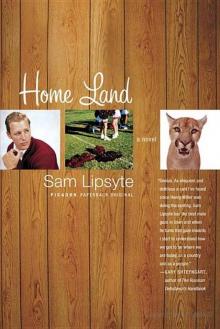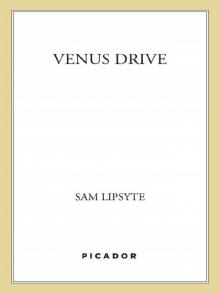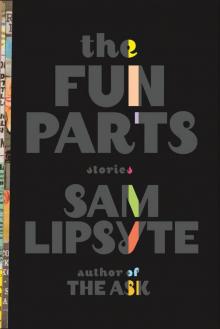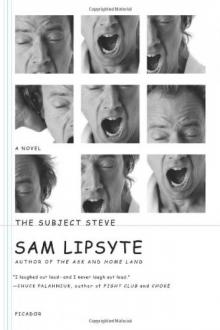- Home
- Sam Lipsyte
Venus Drive Page 3
Venus Drive Read online
Page 3
The man sweeps a hand for the whole stone room, all the slit-shot-caught-a-stroke dead, all the broken-back-mothers-of-dagos dead, all the mick dead and time-of-day dead and which-ones-are-the-kikes-kike dead, all the cut-through Gypsy dead, the kosher-paper-lady dead, the blued-over, see-through, Alleghenian steel-smoke dead, the college-drumsand-money-clip-we-don’t-ask-where-the-bullet-came-from Chersky dead.
The man says, “Bad breathing, huh?”
The man says, “Looks like an epidemic to me.”
I’m Slavering
Everybody wanted everything to be gleaming again, or maybe they just wanted their evening back. Everybody was from everywhere, had gathered here to hide from the daylight. Some of these people sat around a marble table with straws in their hands. It looked like they were waiting for lemonade. They were trying to get my friend Gary on the phone to get more lemonade. It was early, late, lockjaw hour.
“Is it like this in Geneva?” I said to a man at the table. I was new here, recommended to the straw people by Gary. I felt like the pupil of a great instructor out alone in the dead city.
“Is what like what?” he said.
“Is this like this?”
“I’m from Scarsdale,” he said. “All I can tell you about is Zurich.”
About then the woman with the telephone called out the terrible news.
“Gary’s not anywhere,” she said.
There were moans, whispers, ruminations on fate, hard words for God. People started to shuffle out of the room. A few fell on the coat pile in the corner.
“This is why I hate America,” said the man from Scarsdale. “This brand of bullshit. Where the hell is Gary?”
“He told me he’d be over later,” I said.
“That’s exactly what I’m talking about,” said the man. “And here comes the fucking sun.”
The man bent his straw into a periscope, poked it over the windowsill.
“The sun, the sun,” he said. “You fiery whore.”
“Maybe I can find Gary,” I said.
“You flame-blown bitch,” he said.
“I think I know where Gary is,” I said.
The man from Scarsdale spun his periscope.
“That’s a good story,” he said. “Work with that story.”
I walked around the ruined sectors of the city and worked with that story.
It was really my story and it went like this: shaky, steady, shaky, steady. I was in shaky right now. I tended to waste a lot of time looking for Gary. It’s difficult to stay the course to steadiness when you’ve got to find Gary all the time. It’s difficult to do anything at all. Sometimes, when I needed money, I stole my girlfriend Molly’s stuff, but the quality goods were running low. To top it off, I was pretty certain I was suffering from that deficit thing. That disorder. Everything flickered a lot, and I never knew which story I was working with.
Take the story of Gary’s thumb. Many years ago, on the eve of manhood, Gary sawed it off with his father’s Black & Decker table saw. Gave it to his mother on an olive dish, or maybe it was a cookie plate.
“You should have seen the look on my mother’s face,” said Gary, back from emergency.
The truth was, you could still see it on her a few days later, there in the bar mitzvah ballroom. That kind of look, it doesn’t disappear, even with all that disco-nagila going, and Gary bouncing high in the chair. Gary’s uncles, men with great bony mouths, slid Gary from his throne into my arms. I held him there, the bandaged hand between us, and under the din of Hebrew synths, I asked him why he did the sawing.
“They wouldn’t let me watch TV,” he said. “The late movie. Now I watch all hours. Anything I want.”
That’s the story how Gary left his thumb and his youth behind, though they did sew the dead thumb back on.
We had years as strangers before I saw him again, but somehow I’ve always been following Gary. What he did to his thumb made him, I believe, a wisdom-giver.
Me, I was never bar mitzvah’d. According to the tenets of my faith, I’m nothing close to a man, though I have a hairy neck and look older.
Walking around now I thought of all the times I used to walk around and see Gary on the streets of this city. It’s funny to see someone down here from your town. You think everyone will stay behind and do everything you did all over again, forever. You picture old geezers in jean jackets doing whip-its behind the plaza.
But I got out and Gary got out. Everybody gets out. Getting out is not the problem.
You can picture what the problem is.
For instance, Gary tried to be a rock star, even trained his bad thumb to squeeze on a guitar pick, but rock was dead.
“Somebody should have mentioned something,” he said.
Next thing, I see him loitering near trust-fund bistros, looking smug and hunted.
“I’m in goods and services,” he said. “It’s the only uncompromised medium left.”
That was when I decided to buy his services, his goods. I was in a steady phase, but Molly was tired of my clarity. It’s hard to fuck your girlfriend when she’s fucked up and you’re not. It’s harder than the Skee-Ball they used to have at the Plaza arcade, all that agony over a fuzzy prize.
Now the sun was clearing the rooftops, the water towers. I thought of the man with the periscope. I looked for Gary in all of the Gary places, but I was too early. These places were all haunted by the future of Gary.
I wanted to score for the straw people, maybe make Gary proud.
I wanted to have friends from all over the world in the way of a man who has no friends. Maybe some of them were still heaped on the coats.
I went home when I knew Molly would be at work and started to pull her music off the shelves. This was what I called a mercy burgle, all those bands overmuch with faux hope for the world and untricky beats. I unloaded a stack of them on a British guy with a store down the block. He got by selling crap at a mark-up to club kids—used-up ideas, pants unpopular in their own time.
“I just staple a tag on and they buy it,” he told me. “It helps that I’m a Limey.”
The Brit’s eyes had this pucker of awful witness. He’d been everywhere just as everything got ugly: art, philosophy, rugby, love. Maybe what he’d seen had made his teeth fall out, too.
I asked him if he knew where I could get what the straw people needed.
“I don’t travel that road anymore,” he said. “It’s clogged with idiots like you. Now sod off.”
He held a mug of tea and I noticed a sliver of cellophane floating on top. Was that the new dead style?
I went down to the park and watched the sparrows peck things off the blacktop. Those animal kingdom shows I always watched with Molly made like there were animal societies, but these birds just hopped around unbidden. I picked one sparrow to be the hero. He proved himself the moocher of the flock.
There was a man in Lycra on a nearby bench, breathing hard, a paper sign pinned to his chest.
“RACE FOR THE CURE,” the sign said.
I went over to another bench and waited for a feel in the air that would mean the coming of Gary.
“I’m resting,” said the racer. “I’m going to get up. Just give me a damn minute.”
People always said that what Gary did to his thumb was due to a disturbance, but I figured it happened in a moment of calm. Once he sawed off his thumb and gave it to his mother on a breakfast tray, he was in the free and clear. Who would ever bother a boy like that again? Who would tell him when to go to bed?
This is what I mean by wisdom.
The death of rock was just bad luck.
But Gary was getting it together. Meanwhile, he was mentoring me. The last time I’d seen him he came over with his knapsack, dumped out pills, powders and plant kingdoms on the kitchen table. Molly was gone and I looked around for something of hers to give Gary.
“Hey, are you sure you can handle all this stuff?” he said, pinched a razor blade between his living finger and his dead thumb. “Look a
t you, you’re slavering.”
I asked Gary for some girlfriend advice.
“Do you love her?” said Gary.
“That’s what I’m asking you,” I told him. “Do I?”
He kept propping his thumb up against the side of the razor.
“Why don’t you use the other hand?” I said.
“Give a man a fish,” said Gary.
“You want fish?” I said.
Now Molly was home with her mortar, her pestle. She liked to crush things for wellness when enough was enough.
“You’re home,” I said.
I smelled fennel.
“I had a headache.”
“I’m sorry,” I said.
“So sorry you went and took more of my stuff? Don’t tell me, you just need it for a little while.”
“I need to find Gary,” I said.
“You need a better embalmer,” she said. “Look at you.”
“Look at these,” I said, spread out my hands for her, my thumbs. “These are all that separate us from the beasts of the field.”
“What beasts?” said Molly.
“The ones of the field. In the field.”
“Actually,” said Molly, “that’s a myth.”
“Actually,” I said.
“I mean,” said Molly, “factually.”
“If Gary calls,” I said, “tell him I love you.”
“Get the hell out of here,” said Molly.
“Just give me a damn minute,” I said.
I went to get some coffee, to think hard about where Gary might be. But then I started to think hard about what Gary said about fish. Give a man one why?
There was a straw dispenser on the counter next to my coffee cup. You pushed a little lever and the straw jerked out.
I had a flitter, a flicker.
I saw Gary bouncing high in his ballroom chair. I saw him carried in it across the city, waving to crowds with his bandaged hand. His tusked uncles bore him across wide avenues full of birds. They took him into all of the Gary places, the parks, the bars, bodegas. Gary’s mother and the Brit danced around the chair with feathered parasols. I was running to keep up. I had a message to deliver, memorized on some prior occasion. The message went: “I am running to keep up.”
A hand poked out of the crowd and hooked my arm.
“Pay extra to nod on my counter,” the coffee man said.
“I wasn’t nodding,” I said. “I was passing out. You want to work in this town you should learn the difference.”
I paid for the coffee and headed off to the straw party. I pictured the man from Scarsdale watching me arrive through his periscope.
There were only a few coats left on the hallway floor when I got back. Through a doorway I saw some of the women on a bed. One slept with her tongue out in the other one. A phone glowed open in her hand.
I heard Gary in the next room, laughing with the man from Scarsdale. They looked to be lords of something fallen. There were white dunes and straws on the marble, pills and cash on the floor.
“This guy,” said the man from Scarsdale, pointing. “He was here before. Who is he?”
“He’s a rising young angler,” said Gary.
“Come again?”
“Give a man a fish,” said Gary.
“Ah, yes,” said the man from Scarsdale. “Many applications to that little homily. Gary here has not yet taught me how to fish, so it’s a good thing he finally came over. I was starting to do lint off the carpet again. Are you familiar with the fable of the dropped rock?”
“He knows all about it,” said Gary, chopping, sifting.
“Hey,” the man said to Gary, “what happened to your thumb? Did you break it?”
“Childhood accident,” I called from the couch.
“Yeah,” said Gary, “my mother misjudged me.”
“Listen,” I said, “I just saw this guy with a sign on his shirt. RACE FOR THE CURE, it said.”
“Sucker,” said the man from Scarsdale, stood.
“Where are you going?” said Gary.
“Me?” said the man from Scarsdale. “I’m going into the bedroom. I’m going to put some of this shit on my cock and slip it in those dyke asses before they know what hit them. Then I’m going to take some valium and fall into a deep, beautiful sleep filled with dreams of Geneva.”
The man from Scarsdale winked at me, walked out of the room.
“Jesus,” said Gary.
“Christ,” I said.
“I mean, what is that?” said Gary. “What are we supposed to do with that?”
He stared into the mirror. His razor hand shook.
“Tell me what I’m supposed to do with that?” said Gary.
“It’s okay,” I said. “He’s just some guy.”
“I’m tired,” said Gary. “I’m so tired.”
“Everything’s fine,” I said. “You’re here. I’m here. Everything’s fine.”
“Fuck here,” said Gary. “We were from a town. A little town. Do you remember?”
“What a question,” I said.
“There were people there,” said Gary, “There were cars. Carports. You knew where to park.”
“Dog hatches in the doors,” I said. “Dog doors. Nearmont Avenue. The trestles on Main.”
“Spartakill Road,” said Gary. “Venus Drive. The Hobby Shop, the Pitch-n-Putt, Big Vin’s Pizza, the Plaza.”
“Behind the Plaza,” I said.
“Exactly,” said Gary. “Behind it.”
We were quiet for a while.
“Evil’s not one thing,” said Gary. “They didn’t teach us the gradients. We could have stayed.”
“Blown our brains out in our cars,” I said.
“Not me,” said Gary. “What did he mean, Geneva?”
I got up, took the man from Scarsdale’s seat, pressed Gary’s dead thumb in my hand.
“Are you sorry you did it?” I said.
“Get the hell off me.”
I stroked his thumb, brushed it, tenderly, the way you would a blind, tiny thing fresh-pulled from a hole.
“Just tell me if you’re sorry,” I said. “Because here we are. Because, me, I’ve been following you. Do you understand that? I’ve been following you all along. So, just tell me, are you sorry?”
“Hell, no,” said Gary. “I wanted to watch TV. Anyway, what’s done is done.”
“Done and gone,” I said.
“Don’t fucking wallow,” said Gary, and pulled his thumb away. “Never fucking wallow. You wallow, you’re pretending you were something else in the first place. I know who I am. I’m Gary. I go down into the street, I’m Gary. I’ve never stopped being Gary. There’s no cure for it. There’s no race. It’s not a race, okay? It’s a contest. Do you get what I’m saying?”
“Yes,” I said. “I’m with you.”
He walked over to the window, a vista of sky, brick.
“Don’t be with me,” said Gary.
Admiral of the Swiss Navy
I can’t remember the name of the camp. It was somewhere near a lake near Canada. I learned a good deal there that I would later rely upon when I threw away my youth. What I learned when I threw away my youth was crucial in my development as a misdirected man, so maybe it’s all connected. What they say about character is true, though I can’t quite remember what they say about it.
That summer we used to get stroke books for us to stroke ourselves with at bedtime. We used to get them from this trunk our counselor dragged between our cots.
“Dig in, faggots,” he’d say.
We were all of us vicious getting to the good ones. We’d never seen stuff like this in our towns.
Some of us used to go smoke cigarettes behind the Port-O-Sans. Mr. Marv caught us one time, wanted to make a point. He was going to send us packing, which I guess is not a big deal looking back, but at the time it was seen as a stain. Plus to have your dad drive up in that sad kind of station wagon. What I did was give Mr. Marv some of the names he needed. I gave him the name
s of boys you’ve never heard of but who were known saboteurs of good camp citizenship. I’m not sorry I did it, either. If I saw those boys today, I’d say, “You brought it on yourselves.”
I did see one of them in a coffee shop once. It’s doubtful he made me. His eyes had the ebb of his liver in them and he bore the air of a man who looks right at you and only sees the last of himself.
“Don’t worry,” I told him. “You didn’t miss anything that year. Except maybe Van Wort.”
“Who are you?” he said.
“I’m the ghost of Van Wort,” I said, and got out of there. There’s no gain in having a fellow goner watch you order all-night eggs.
Van Wort was the fat kid who put our camp all over the local news that summer, and if you were localized near Canada and watching TV back then, you might have caught my debut. I was the one standing in the dining hall saying, “He brought it on himself.”
I don’t think I believed that, even then, but I guess I wanted to say something memorable, something beyond my years. I could have said what a terrible tragedy it all was, but Mr. Marv seemed to be in charge of that part.
Mr. Marv was probably of a type but I only ever knew him. He wore swim togs and parted his hair like a magician. They said he was a teacher of history in the winter somewhere. That summer, though, he was just Mr. Marv, blitzed at the bonfire, babbling on about the time he was a kid and sneaked into a ball game. He had come to see this DiMaggio take the field on bad feet. Bone spurs, Mr. Marv told us, ankle damage, the last of the brave.
What was he talking about, bone spurs?
What’s so brave about that?
I slept next to Van Wort. I listened to the air whistle in and out of his fat chest. He said he had a chronic bronchial. He said it like a lie he made up a long time ago.
I watched them come to him night after night, boys with their mosquito sprays, their shampoos, tennis rackets and combs, warm water in toothbrush cups. Van Wort was fat and his name was Van Wort. With that combination, why would you pack your kid off to camp? Let him play with ladybugs in the safety of his own lawn.

 Home Land
Home Land Venus Drive
Venus Drive The Fun Parts
The Fun Parts The Ask
The Ask The Subject Steve: A Novel
The Subject Steve: A Novel